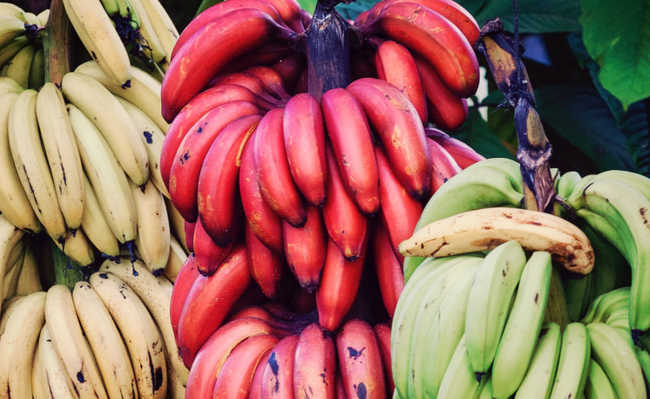Bananas: 11 amazing benefits
The benefits that bananas can provide to health are based on scientific analysis

Unsplash image of Ovidiu Creanga
Bananas are extremely delicious. And the good news is that this is not its only quality. Bananas are also very rich in essential nutrients and also provide benefits for digestion, heart health, blood sugar levels, among others.
Check out eleven health benefits of bananas
1. They are a source of nutrients
Bananas are among the most popular fruits. Despite being native to Southeast Asia, they are cultivated all over the world, and can be found in many sizes, colors and shapes, the most common being the yellow banana, which is green before ripening.
A medium banana (118 grams) contains (check here analyzes about: 1, 2, 3):
- Potassium: 9% of the RDI (Recommended Daily Intake);
- Vitamin B6: 33% of the IDR;
- Vitamin C: 11% of the RDI;
- Magnesium: 8% of the IDR;
- Copper: 10% of the IDR;
- Manganese: 14% of the IDR;
- Liquid Carbohydrates: 24 grams;
- Fiber: 3.1 grams;
- Protein: 1.3 grams;
- Fat: 0.4 grams.
Each banana contains only about 105 calories, mostly water and carbohydrates. Bananas contain little protein and almost no fat.
2. Help regulate blood sugar levels
Bananas are rich in two types of fiber: pectin and resistant starch. These two substances help to regulate blood sugar levels (see studies on this: 4, 5, 6).
In addition, bananas have a low glycemic index (a measure from 0 to 100 that quantifies how quickly foods raise blood sugar levels). While the glycemic value of green bananas is around 30, ripe bananas have a glycemic index around 60. The average value of all bananas is 51 (see studies about it here: 7, 8).
This means that banana consumption does not cause large spikes in blood sugar levels in healthy individuals. However, this may not apply to diabetics, who should avoid eating overripe bananas (because of the sugar) and carefully monitor their blood sugar levels.
3. Improve digestion
Consumption of dietary fiber (a non-digestible carbohydrate present in plant-derived foods) has been associated with many health benefits, including improved digestion.
A medium-sized banana contains about three grams of fiber, which is composed of pectin and resistant starch, as already mentioned. However, the more mature, the smaller the amount of fiber.
The resistant banana starch is not digested; therefore, it arrives in the intestine in its integral form, serving as food for the beneficial microorganisms of the intestinal flora, also known as probiotics. To learn more about them, take a look at the article: "What are probiotic foods?"
Furthermore, studies suggest that pectin helps protect the body against colon cancer (see studies about it here: 9, 10).
- What are high fiber foods
4. Help to lose weight
Bananas are allies of those who want to lose weight in a healthy way. For starters, an average banana contains just 100 calories and still manages to be nutritious and stomach-filling.
Eating plant-based fibers has been associated with lower body weight and weight loss (see studies about it here: 11, 12, 13). And bananas... you already know... They're full of fiber! See 21 foods that help you lose weight with health.
5. Improve heart health
Potassium is an essential mineral for heart health, especially for blood pressure control. However, despite its importance, most people do not consume the ideal amount of potassium (see study about it: 14). But our allies bananas do not let us down: they are very rich in potassium and the mineral helps to regulate blood pressure, and its consumption is associated with a 27% lower risk of heart disease (see studies on this: 14, 15, 16, 17).
Bananas are a great dietary source of potassium. A medium banana (118 grams) contains 9% of the RDI of potassium.
In addition, bananas contain a fair amount of magnesium, another mineral that is also very important for heart health. Learn more about it in the article: "Magnesium: what is it for?".
6. Contain powerful antioxidants
Fruits and vegetables are excellent sources of antioxidants, and bananas are no different.
They contain several types of antioxidants, including dopamine and catechins (see studies on this here: 18, 19).
These antioxidants have been associated with health benefits such as reduced risk of heart and degenerative diseases (see related studies: 19, 20).
However, because of dopamine, it is common to find that bananas act as a chemical in the brain, positively interfering with mood. But this is not true, the dopamine in bananas does not cross the blood-brain barrier. This means that it simply acts as a strong antioxidant (see studies on this here: 20, 21).
7. Increase the feeling of satiety
Green bananas are the richest in resistant starch and pectin. In addition to the benefits mentioned in the topics above, these fibers reduce appetite and provide a feeling of satiety (see studies about it: 22, 23, 24, 25).
8. Improve insulin sensitivity
Insulin resistance is a major risk factor for many of the world's most serious diseases, including type 2 diabetes.
- Diabetes: what it is, types and symptoms
Several studies have shown that 15 to 30 grams of resistant starch per day can improve insulin sensitivity by 33-50% in just four weeks (see studies on this here: 22, 23).
Green bananas are an excellent source of resistant starch and can help improve insulin sensitivity.
9. Can improve kidney health
Potassium is essential for blood pressure control and healthy kidney function, and as you already know, bananas are very rich in this mineral.
A study of women showed that, over 13 years, those who ate bananas two to three times a week were 33 percent less likely to develop kidney disease.
Other studies have found that people who eat bananas four to six times a week are nearly 50% less likely to develop kidney disease, compared to people who do not eat bananas (see studies on this: 24, 25).
10. May have benefits for exercise
Bananas are often referred to as the perfect food for athletes, mainly due to their mineral and carbohydrate content that can be easily digested.
According to one study, eating bananas can help reduce exercise-related muscle cramps and pain, which affect up to 95% of the general population. The reason for the cramps is unknown, but a popular theory claims it is a mixture of dehydration and electrolyte imbalance (see studies on the topic here: 26, 27, 28).
Other studies, however, have found no relationship between banana consumption and reduced cramps. But on the other hand, other research has shown that bananas are capable of providing excellent nutrition before, during and after exercise.
11. Are easy to add to the diet
Not only are bananas incredibly healthy – they're also one of the easiest foods to add to your diet.
They make a great addition to breakfast. You can even use them in place of sugar when they are ripe. Another benefit is that bananas rarely contain pesticides due to their thick protective coating, which also makes it easier to transport them to a snack during the day.










